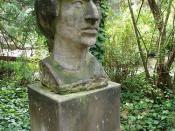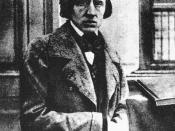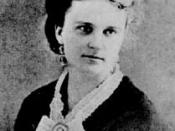Death: Natural or Unnatural In the story of "An Hour"ÃÂ by Kate Chopin the main character Mrs. Mallard dies of apparent heart disease. Chopin leaves the death of Mrs. Mallard open and allows the reader to make up their mind by using their different reasons for her death. Death is not always due to natural causes and Chopin explores these through: death of Mrs. Mallard due to the joy of seeing her husband, her guilt for feeling free, and the shock of seeing him alive at the end after hearing of his death.
The introduction of the story tells the reader that Mrs. Mallard suffers from a heart condition. I don't think the story would have ended with her death due to the shock of seeing her husband alive. It would most likely have been because of the guilt that she felt for planning her future without her husband so soon after his death.
The surprise of seeing her husband alive would have been an easily drawn conclusion as to why her heart failed. Chopin, however, was known for her writings along that of mystery and would have made more underlying and suttle hints as to why Mrs. Mallard died. On example of her use of suttely is at the end of the story where Mrs. Mallard comes down from her room and sees her husband coming through the door, and the quote that is used is "doctors came they said she had died of heart disease "ÃÂ of joy that kills"ÃÂ (13). Chopin used a lot of these underlying factors in her writings to allow the reader to stretch their minds.
Chopin should not have made the ending cleaner, because if Mrs. Mallard had died from guilt for feeling free she may have died earlier in the story. This would have been an uncomfortable reality based on the fact that she showed a selfish attitude after hearing of her husband's death. After Mrs. Mallard heard the tragic news of her husbands passing she began to explore the possibilities of what she would and could do as a free person. Chopin could not end the story on this note because Mrs. Mallard would have seemed like a very cold and selfish person. Most women a hundred years ago would mourn the loss of their husbands for up to a year. They would wear only black to symbolize their loss of a laved one. A lady at this time would never have been thinking of her freedom especially so soon after the loss of her husband as Mrs. Mallard did.
Chopin did not end the story of death as a shock at the awareness that Mrs. Mallard's freedom is lost. If the value of freedom were more important to Mrs. Mallard than beloved husband, then Chopin would have emphasized more on Mr. Mallard's death rather than his life and caring nature. In most cases at the time of a person's death, their loved ones are focused used more on how that person lived their life. Mrs. Mallard showed that she was only thinking of herself when she was thinking if all of the coming years she would spend doing what she wanted to do rather than what her and her husband would do together.
Dying from heart trouble is a natural cause of death, but dying from guilt or selfishness could be labeled as shameful and unnatural. The reader is left to decide for him or herself what was the actual cause of Mrs. Mallard death. She could have died because she was overjoyed at the sight of her husband coming through the door after the news of his death. She could have also succumbed to her heart condition because she felt quilt for planning her freedom away from her husband. She could have just been overwhelmed from all of the excitement that she went through in an hour's time being married, to single back to married again.
Works Cited Chopin, Kate. "Story of an Hour"ÃÂ. Literature for Composition. Ed. Sylan Barnet et al. 5th ed. New York: Longman, 2000 12-13.





